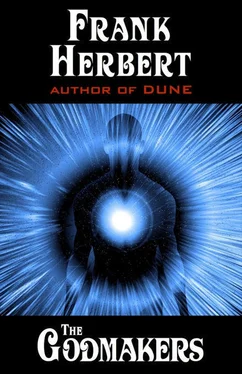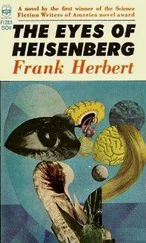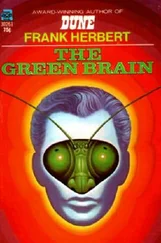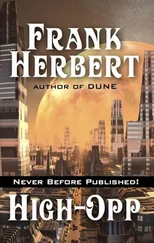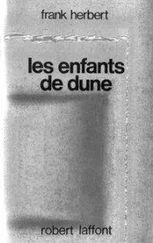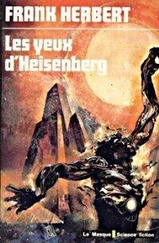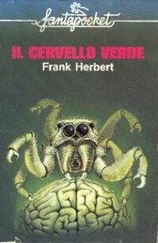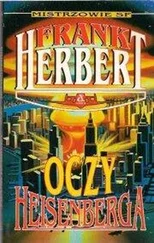A bronze clangor echoed behind him. The green wall returned to its featureless gray. Footsteps slapped the floor. Hands worked at the bowl on Orne’s head, lifted it gently. The straps that had confined him fell away.
Bakrish came around to stand in front of Orne.
“You said it was an ordeal,” Orne panted.
“And I warned you about hate,” Bakrish said. “But you are alive and in possession of your soul.”
“How do you know if I still have my soul?”
“One knows by the absence,” Bakrish murmured. He glanced at Orne’s wounded arm. “We must get that bandaged. It’s night now and time for the next step.”
“Night?”
Orne peered up at the slitted windows in the dome. They gave him a view of darkness punctured by stars. He looked around the giant room, realized the shadowless exciter-light of glow-globes had replaced the daylight. He said: “Time goes quickly here.”
“For some it does,” Bakrish sighed. “Not for others.” He motioned for Orne to get up. “Come along.”
“Let me rest a moment. I’m worn out.”
“We’ll give you an energy pill when we bandage your arm. Hurry along now!”
“What’s the rush? What am I supposed to do now?”
“It is apparent that you understand the two faces of a miracle,” Bakrish said. “I observe that you have a personal mystique, an ethic in the service of life, but there is much more to your ordeal and the time is short.”
“What’s next?” Orne asked.
“You must walk through the shadow of dogma and ceremony. It is written that motive is the father of ethics and caution is the brother of fear…” Bakrish paused. “…and fear is the daughter of pain.”
Silence is the guardian of wisdom, but loud jesting and levity lead a man into his own ignorance. Where there is ignorance there is no understanding of God.
—Sayings of the ABBODS
“He shows a nice restraint,” the Abbod said. “I observe that in him: a nice restraint. He doesn’t play with his powers.”
The Abbod sat on a low stool in front of his fireplace, Macrithy standing behind him with the latest report on Orne. In spite of the hopeful words, there was sadness in the Abbod’s voice.
Macrithy heard the tone, said: “I, too, observe that he did not call his woman to his side or otherwise experiment with the Great Machine. Tell me, Reverend Abbod, why is it you do not sound happy about this observation?”
“Orne will reflect upon this himself, given time. He will see that he does not need the machine to do what he wills. What then, dear friend?”
“You have no doubts that he is the god you called up?”
“No doubts at all. And when he discovers his enormous powers…”
“He will come seeking you, Reverend Abbod.”
“There will be no stopping him, of course. I don’t even want it tried. There exists only one challenge I pray he will face.”
“We stopped the Speaking Stone,” Macrithy ventured.
“Did we? Or did it turn away in amusement, seeing another purpose in existence?”
Macrithy put his hands to his face. “Reverend Abbod, when will we stop these terrible explorations into regions where we have no right to go?”
“No right?”
“When will we stop?” Macrithy lowered his hands, revealing tearstains on his round cheeks.
“We will never stop short of our total extinction,” the Abbod said.
“Why? Why?”
“Because we began this way, dear friend. This has begun, it had a beginning. That is the other meaning of discovery. It means to open up into view that which has always been, that which is without beginning and without end. We delude ourselves, you see? We cut a segment out of forever and say, ‘See! Here is where it started and here is where it ends!’”
“But that is only our limited viewpoint speaking.”
Order implies law. By this, we indicate the form which helps our understanding of order, enabling us to predict and otherwise deal with order. To go on to say, however, that law requires intent, this is another issue. It does not at all follow from the existence of law. In fact, awareness of eternity opens quite a contrary view. Intent requires beginning: first, the intent and then the law. The essence of eternity is no beginning, no end. Without beginning, no intent, no eternal motive. Without end, no ultimate goal, no judgment. From these observations, we postulate that sin and guilt, products of intent, are not fixed derivatives of eternity. At the very least, such concepts as sin-guilt-judgment require beginnings, thus occur as segments of eternity. Such concepts are ways of dealing with finite law and, only incidentally, with eternal matters. It is thus we understand how limited and limiting are our projections onto Godhead.
—ABBOD HALMYRACH, Challenge of Eternity
The night air carried a chill nip, making Orne thankful for the thickness of his toga. Bakrish had led him to a large park area enclosed within the religious warren. Birds cooed from trees in the deeper shadows. The place smelled of new-mown grass.
There were no artificial lights in the immediate area, but Bakrish followed a rough path as though he could see it and Orne followed the dim outline of the priest’s robe. Ahead of them, a hill stood outlined against stars. Up the hill marched a snaketrack of moving lights.
Orne’s injured arm still ached, but an energy tablet had walled off his weariness.
Bakrish spoke over his shoulder: “The lights are carried by students and each is accompanied by a priest. Each student has a two-meter pole with a lighted box atop it. The box has four translucent sides, each of a different color, as you can see—red, blue, yellow and green.”
Orne watched the lights flickering like phosphorescent insects on the dark hill. “What’s the reason for all this?”
“They demonstrate piety.”
“Why the four colors?”
“Ahhh, red for the blood you dedicate, blue for truth, yellow for the richness of religious experience, and green for the growth of life.”
“How does marching up a mountain show piety?”
“Because they do it!” Bakrish picked up the pace, deserted the path to cross a stretch of lawn. Orne stumbled, hurried to catch up. He wondered again why he allowed himself to follow this ordeal.
Because it might lead him to the Abbod? Because Stetson had ordered him to carry out this assignment? Because of his oath to the I-A? None of these reasons seemed adequate. He felt trapped on a narrow track which he might leave as easily as Bakrish had left the pathway behind them.
The priest stopped at a narrow open gate through a stone wall and Orne grew aware that a line of silent people was passing through the gateway. Hands reached out from the line to take long poles from a rack beside the gateway. Lights bloomed into existence beyond the wall. He smelled human perspiration, heard the shuffling of feet, the swish of robes. An occasional cough sounded, but there was no conversation.
Bakrish took a pole from the track, twisted the base. Light glowed from a box at the top of the pole. The box was turned red side toward the procession through the gate. It cast a ruddy glow on the people—student and priest, student and priest, eyes downcast, expressions sober and intense.
“Here.” Bakrish thrust the pole into Orne’s hands.
It felt oily smooth to Orne. He wanted to ask what he was supposed to do with it besides carry it… if anything, but the silence of the procession daunted him. He felt silly holding the thing. What were they really doing here? And why were they waiting now? Bakrish took his arm, whispered: “Here’s the end of the procession. Fall in behind; I will follow you. Carry your light high.”
Читать дальше
